Fox News Flash top headlines for November 15
Fox News Flash top headlines are here. Check out what's clicking on Foxnews.com.
It was clear to Democrats the two just had to go together. It was only natural.
Oh. You thought we were talking about the infrastructure bill and the social spending plan?
Surely you jest.
We’re talking about the views of House Democrats over the process as they tried to advance both of those bills recently.
"This is a sh---show," moaned one exasperated senior House Democratic leadership aide.
"The whole day was a clusterf---," complained Rep. Mark Pocan, D-Wis.
JAYAPAL ON SOCIAL SPENDING BILL PROGRESS: 'WE WILL HAVE A VOTE THIS WEEK'
As it turns out, the characterizations of "sh---show" and "clusterf---" were a natural pairing for Democrats. They just went together. Especially as Democrats struggled to adopt their domestic agenda after weeks and months of fits and starts.
After all of the back-and-forth, the House finally aligned with the Senate, approving the bipartisan infrastructure bill, late on Friday night, Nov. 5. The Senate OK'ed the same plan in early August.
That was the easy part. Even two visits to the Capitol by President Biden in late September and late October failed to unlock passage of the infrastructure plan.
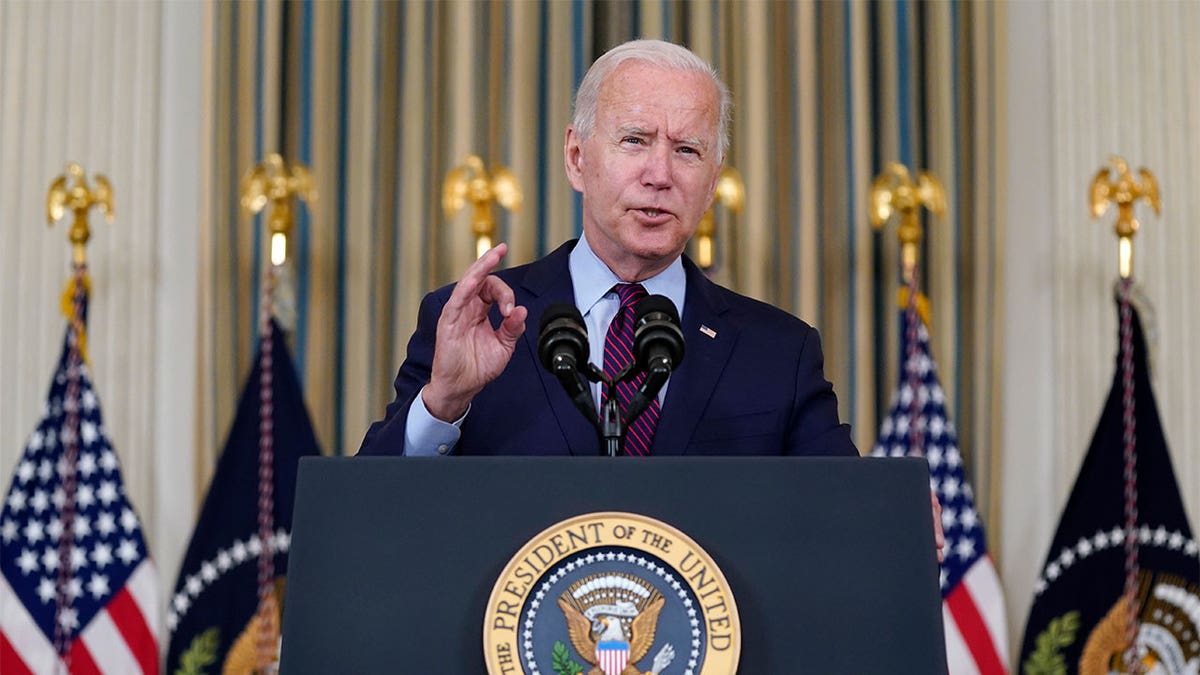
President Joe Biden delivers remarks on the debt ceiling during an event in the State Dining Room of the White House, Monday, Oct. 4, 2021, in Washington. (AP Photo/Evan Vucci)
The House even conducted the longest roll call vote in history on Nov. 5 – a staggering seven hours and five minutes – just to eat up time as negotiations continued offstage. The House established the old record on Nov. 22, 2003. A vote on Medicare/prescription drugs consumed two hours and 55 minutes.
Now, comes the hard part: advancing the social spending package through the House and Senate over the next few weeks — and not getting tripped up by a collision with the debt ceiling and a potential government shutdown on Dec. 3.
A deep dive into the play-by-play of Thursday, Nov. 4 and Friday, Nov. 5 reveals just how challenging it was for Democrats to advance their agenda.
The initial plan was to approve both the infrastructure bill and the social spending package. Senate Majority Leader Chuck Schumer, D-N.Y., even proclaimed he’d put the social spending measure on the floor the week of Nov. 15. Schumer’s now pushed that back since the House is still wrestling with the bill this week.
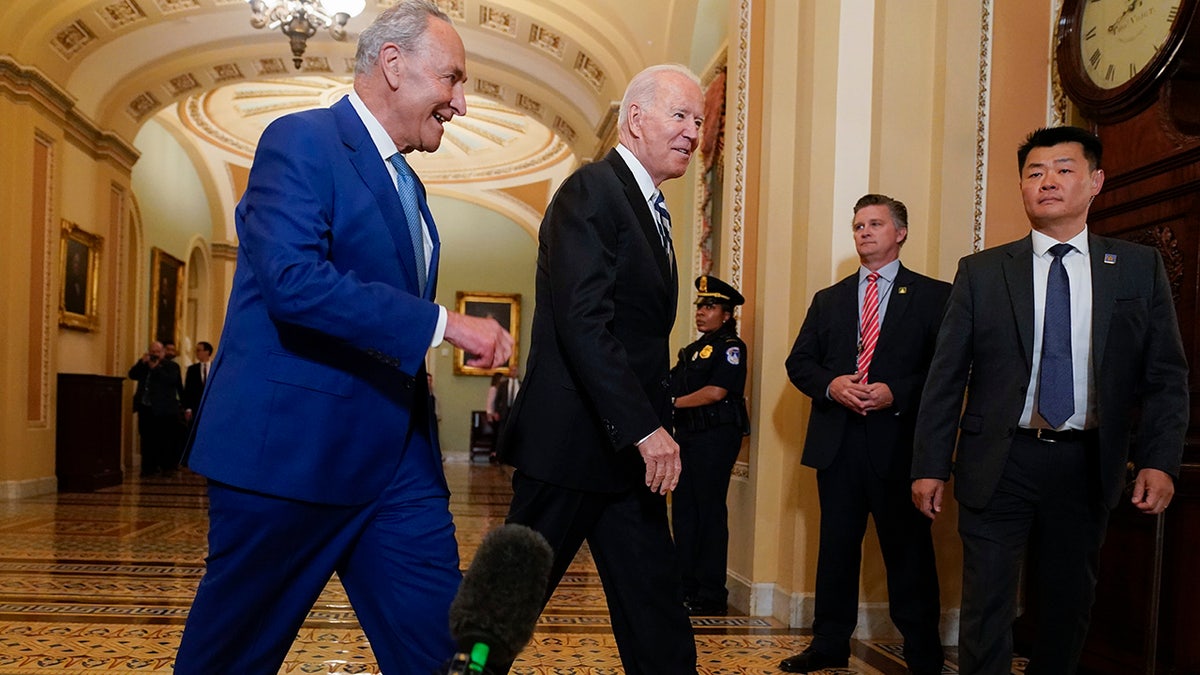
President Biden walks with Senate Majority Leader Chuck Schumer, D-N.Y., at the Capitol in Washington, Wednesday, July 14, 2021, as he arrives to discuss the latest progress on his infrastructure agenda. (AP Photo/Andrew Harnik)
Then House Democrats had to dial back their plans on Nov. 5. They’d just approve a procedural measure teeing up a future debate on the social spending plan and pass the infrastructure bill by itself. Then, late on Nov. 5, it looked for a few moments as though the House may not even be able to pass the infrastructure bill. The House quickly recessed "subject to the call of the chair." That’s never a good sign when a big vote looms. A blue "slate" popped up on the video feed of the House floor on monitors around the Capitol.
For years, longtime Capitol Hill hands have described this frozen picture as "The Blue Screen of Death." If you have the votes, you call the vote on the floor. If you don’t, the House takes a recess of undetermined length until they sort things out. Hence the "subject to the call of the chair," part.
There was a last-minute scramble for moderate Democrats and progressives to finalize a truce. The House would vote on the infrastructure bill that night and progressives would generally support it. In exchange, moderate Democrats would agree to consider the social spending package, in its current form, no later than the week of Nov. 15.
That’s where we are now.
BIDEN’S MASSIVE SPENDING BILL SET TO COLLIDE WITH DEBT CEILING, FUNDING FIGHTS AFTER CBO SCORE DELAY
The House returned to session a few moments later and passed the infrastructure bill, 228-206. Thirteen Republicans voted yea. Six Democrats – all either original or "ex officio" members of the Squad – voted nay.
The machinations were hard to track.
"It was absolute whiplash," mused Rep. Jared Huffman, D-Calif., about the maneuvering. "We have stretched and stretched and stretched. We have an elasticity problem."
A reporter asked Huffman what all of the political and parliamentary calisthenics meant.
"It says we have a threadbare majority," replied Huffman, referring to the Democrats’ three seat margin in the House.
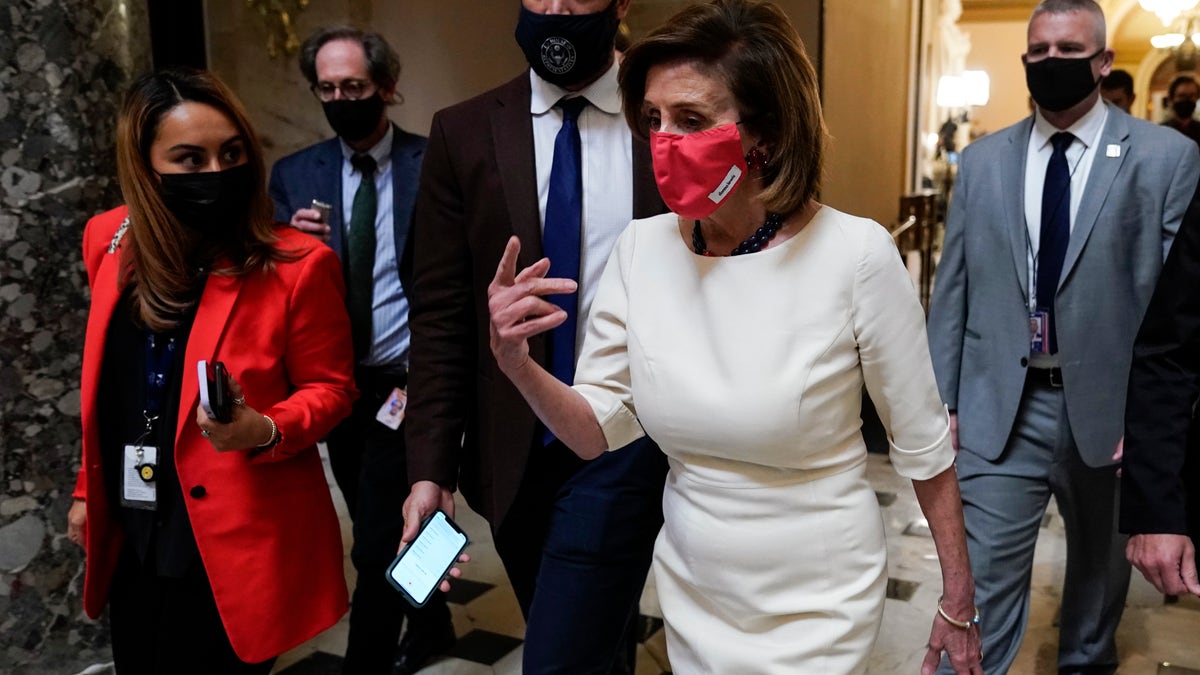
Speaker of the House Nancy Pelosi, D-Calif., speaks to reporters as House Democrats work on infrastructure and spending bills on Capitol Hill on November 4, 2021 in Washington, DC. Democratic moderates and progressives continue to negotiate on the Build Back Better social spending bill. (Joshua Roberts/Getty Images)
You think it was bad then? Try the next several weeks.
Democrats are rattled by election returns in Virginia. Gas prices are spiking. Store shelves are bare. Inflation is the worst its been in three decades. And Democrats are looking at spending more money.
It’s possible the big spending bill Democrats are pushing was right for October. Or, even August. But now Democrats see a problem. Their bill may match the current need. But spending more money as inflation soars may not be an economic nor political antidote.
It is said that generals often fight the last war. The same sometimes happens on Capitol Hill.
Timing is everything in politics. But now Democrats are trying to pass their bill as the holidays hit. That may only underscore economic and supply chain woes.
It’s not a good look.
"The Democratic party as a whole is just not very good at messaging," said David Cohen, a political science professor at the University of Akron. "They excel when it comes to policy and mastering policy details. (However), selling policy and selling legislative achievements has been something that the modern Democratic party has failed at most of the time."
The lack of a Congressional Budget Office (CBO) score or cost evaluation could only delay the process. That’s to say nothing of making hesitant Democrats even more jumpy. Things grow geometrically worse for Democrats the longer this process drags out. And, we could soon see another donnybrook between Democratic moderates and progressives if Congressional leaders need to alter the bill again.
"The price is probably going to continue to go down on this bill," predicted Stephen Farnsworth who teaches politics at the University of Mary Washington in Fredericksburg, Virginia. "A Democratic majority that has 50 seats plus a Vice President is only going to be able to move as far as the most conservative Democrat is willing to move."
This is why Sen. Joe Manchin, D-W.Va., has started to flag his concerns about inflation. And any further changes to the bill could drive liberal Democrats nuts.
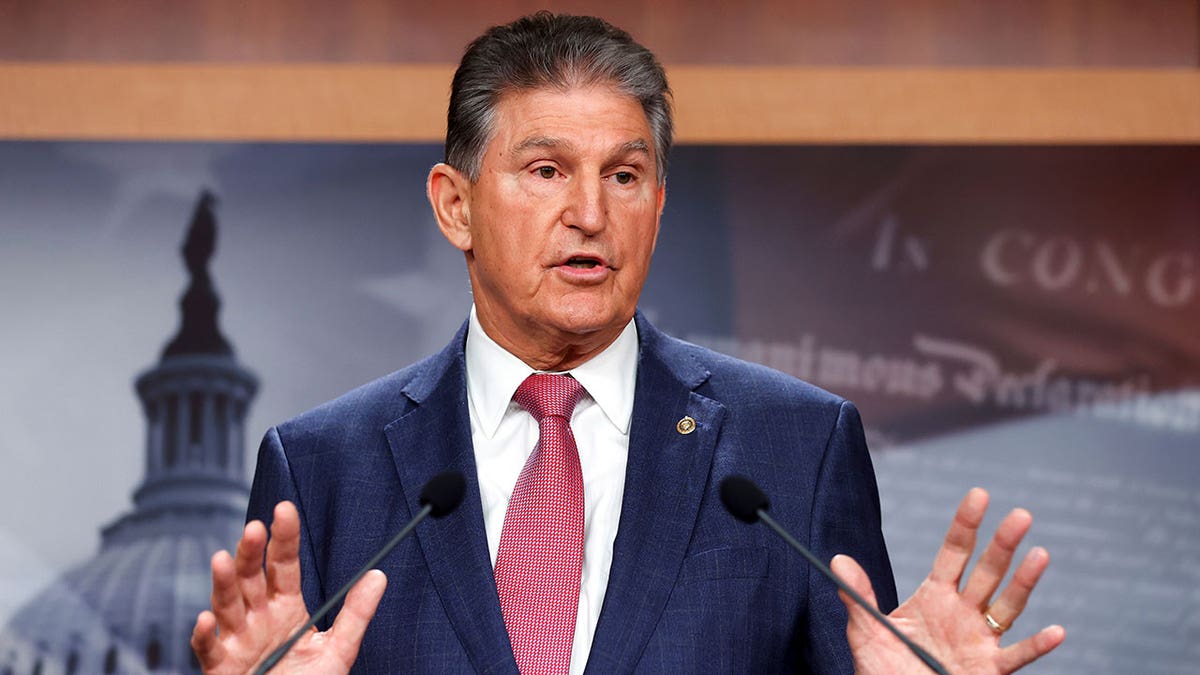
Sen. Joe Manchin, D-W.Va., delivers remarks to reporters at the Capitol in Washington, D.C., Nov. 1, 2021. (REUTERS/Jonathan Ernst)
As we’ve asserted in this space before, moderates may drive the policy. But progressives control the politics.
But on stage, progressives drown out the party’s moderates.
Rep. Ayanna Pressley, D-Mass., was one of the six members of the Squad who opposed the infrastructure bill.
"For months, my progressive colleagues and many more have been holding the line to deliver much needed aid and resources to our communities," said Pressley when explaining her nay vote. "We know that if our nation is truly going to Build Back Better, we need bold investments to address both the human and physical infrastructure needs of our country."
Rep. Cori Bush, D-Mo., also voted nay on infrastructure. Bush echoed her colleague.
"My no vote was not a no on infrastructure," said Bush. "My vote was to keep our leverage to make sure we can deliver the full Build Back Better agenda. My vote was a yes."
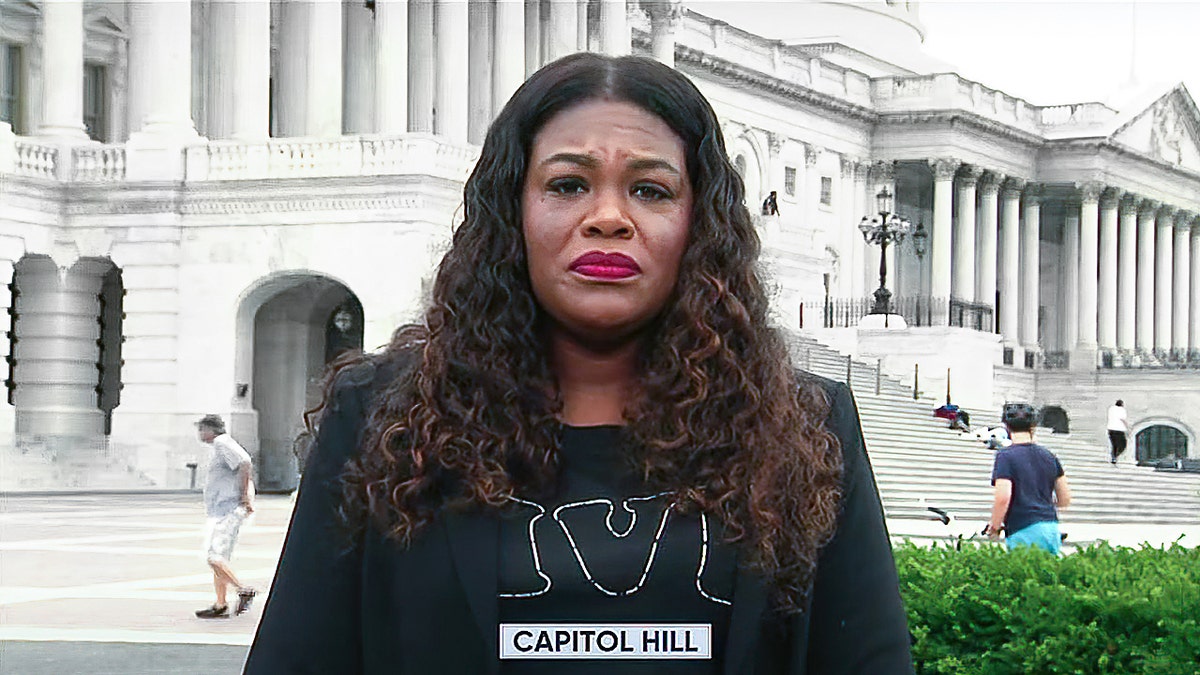
Congresswoman Cori Bush talks eviction moratorium extension (CBSN)
So, here is what the next few weeks may look like:
House Democrats wait for a CBO score. They try to pass the social spending bill in the coming days. If it gets out of the House (and remember how long it took to get the "easy" bill through), the plan goes to the Senate. This week? Next week? Over Thanksgiving? After Thanksgiving? The Senate will need several days to debate and vote on the bill. There will inevitably be changes. Then it returns to the House. The House and Senate must sync up.
CLICK HERE TO GET THE FOX NEWS APP
That presents the most daunting question of all. Can the House approve an altered Senate bill? Perhaps one that is watered down beyond what progressives can stomach?
You already know the answer to that.
Take your pick.
It’s either a "sh---show" or a "clusterf---."










































